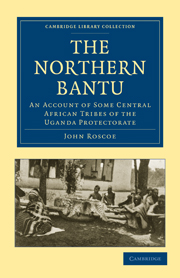Book contents
- Frontmatter
- PREFACE
- Contents
- LIST OF ILLUSTRATIONS
- Uganda and British East Africa
- PART I THE BANYORO A PASTORAL PEOPLE
- PART II THE BANYANKOLE A PASTORAL TRIBE OF ANKOLE
- PART III THE BAKENE, LAKE DWELLERS
- PART IV THE BAGESU A CANNIBAL TRIBE
- CHAP. XV THE BAGESU, CULTIVATION, FOOD AND GOVERNMENT
- CHAP. XVI MARRIAGE, BIRTH, SICKNESS AND DEATH
- CHAP. XVII RELIGIOUS BELIEFS
- CHAP. XVIII MUSIC, DANCING, WARFARE, BUILDING, AMUSEMENTS AND HUNTING
- PART V THE BASOGA
- PART VI NILOTIC TRIBES. THE BATESO AND THE KAVIRONDO
- INDEX
- PUBLICATIONS OF THE CAMBRIDGE UNIVERSITY PRESS RELATING TO AFRICA
- Plate section
CHAP. XV - THE BAGESU, CULTIVATION, FOOD AND GOVERNMENT
Published online by Cambridge University Press: 07 September 2011
- Frontmatter
- PREFACE
- Contents
- LIST OF ILLUSTRATIONS
- Uganda and British East Africa
- PART I THE BANYORO A PASTORAL PEOPLE
- PART II THE BANYANKOLE A PASTORAL TRIBE OF ANKOLE
- PART III THE BAKENE, LAKE DWELLERS
- PART IV THE BAGESU A CANNIBAL TRIBE
- CHAP. XV THE BAGESU, CULTIVATION, FOOD AND GOVERNMENT
- CHAP. XVI MARRIAGE, BIRTH, SICKNESS AND DEATH
- CHAP. XVII RELIGIOUS BELIEFS
- CHAP. XVIII MUSIC, DANCING, WARFARE, BUILDING, AMUSEMENTS AND HUNTING
- PART V THE BASOGA
- PART VI NILOTIC TRIBES. THE BATESO AND THE KAVIRONDO
- INDEX
- PUBLICATIONS OF THE CAMBRIDGE UNIVERSITY PRESS RELATING TO AFRICA
- Plate section
Summary
The Bagesu one of the most primitive of Bantu tribes. The Bagesu are a Bantu tribe living upon the eastern and southeastern slopes of Mount Elgon. They are a numerous people when judged by the numerical standard of other African tribes, being estimated at not less than a million souls. They are a very primitive race and stand low in the human scale, though it is somewhat difficult to understand why they should be so intellectually inferior, surrounded as they are by other Bantu tribes much more highly cultivated and civilised than themselves. They are treacherous and unreliable to persons outside their own clan, even members of their own tribe being unable safely to walk about alone among other clans, except at certain periods of the year when a truce is proclaimed in order to fulfil certain tribal customs and ceremonies. The land may truly be called a land without graves, because the dead are not buried but cast out of the villages in the evening, and during the night portions are cut from the corpse for a ceremonial meal, the rest being left for wild animals.
The higher slopes of Mount Elgon the original homes of the people. The part of the country visited by me was the south-east end of the mountain. The people have their villages on the ridges, which stand out like the ribs of some monster running up the sides of the mountain and leaving deep valleys between them with streams of water which drain the mountain and country.
- Type
- Chapter
- Information
- The Northern BantuAn Account of Some Central African Tribes of the Uganda Protectorate, pp. 161 - 171Publisher: Cambridge University PressPrint publication year: 2010First published in: 1915



